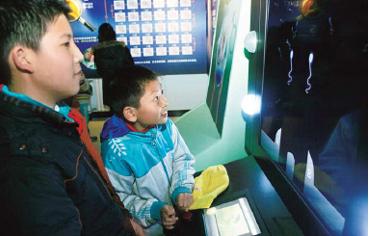A question that every parent dreads
Grown-up talk
In contrast to what is going on in the classroom, the level of information available on the Internet has exploded in recent decades. Unfortunately, not all of it is reliable, which adds to the confusion.
|
Xia Wu (right), a student from No 3 Primary School in Beijing's Huairou district, learns about how sperm meets the egg by playing an interactive game at a sex education exhibition last week. |
Nothing can replace systematic education, argues Chen, who in the mid-1990s pioneered an optional course on the science of sex at Peking University. The lecture is still popular today.
"Children will find out about sex no matter whether you teach them or not but helping them to build up a sound knowledge could save (students) a lot of trouble," he said.
Several Beijing elementary schools contacted by China Daily said they do provide lessons on puberty, but time is limited.
At Shaoyaoju Primary School, six-graders receive just one 40-minute class on the subject. "We can't allow more time for that," said divisional director Liu Yonghong.
A pupil aged 12 at No 3 Primary School in Huairou district said he learned about sperm and eggs from television, his blushing face betraying his embarrassment as he talked. Although curious, he admitted he has never talked with his parents about sex because "its for grown-ups".
Boarding school student Kang Yuanfei, 17, who comes from a suburban county in Northwest China's Shaanxi province, said sex is an "alien concept" to him and his friends.
"No one has taught me anything about (sex)," he said. "During biology classes, teachers asked us to read the chapters about sex ourselves as it isn't required with entrance examinations. When someone did ask about how sperm meets with the egg to make a baby, the teacher stiffly refused to answer."
He also expressed curiosity in learning more because several of his classmates have started dating.
"I don't really discuss sex with my friends. We wouldn't know where to start. I know there is information on the Web but only classmates from rich families have their own computers," added Kang.
 0
0 







